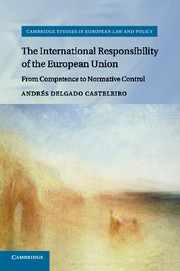Book contents
- Frontmatter
- Contents
- Series Editors' Preface
- Acknowledgements
- Introduction
- 1 The EU's Normative Control and International Responsibility
- 2 Codifying of the Responsibility of International Organizations (I): The Impact of ARIO's Rules of Attribution on the EU
- 3 Codifying of the Responsibility of International Organizations (II): The Impact of ARIO's Rules of Responsibility on the EU
- 4 EU Declarations of Competence to Multilateral Agreements: A Useful Internal Reference Base?
- 5 The Apportionment of the EU's International Responsibility in International Environmental Law: The International Application of EU Declarations of Competence
- 6 The EU's Normative Control and International Responsibility: The WTO Dispute Settlement System
- 7 Normative Control in the EU and the Responsibility of Member States: An Analysis of the Responsibility of the EU in International Investment Law
- Conclusions
- Bibliography
- Index
Introduction
Published online by Cambridge University Press: 05 September 2016
- Frontmatter
- Contents
- Series Editors' Preface
- Acknowledgements
- Introduction
- 1 The EU's Normative Control and International Responsibility
- 2 Codifying of the Responsibility of International Organizations (I): The Impact of ARIO's Rules of Attribution on the EU
- 3 Codifying of the Responsibility of International Organizations (II): The Impact of ARIO's Rules of Responsibility on the EU
- 4 EU Declarations of Competence to Multilateral Agreements: A Useful Internal Reference Base?
- 5 The Apportionment of the EU's International Responsibility in International Environmental Law: The International Application of EU Declarations of Competence
- 6 The EU's Normative Control and International Responsibility: The WTO Dispute Settlement System
- 7 Normative Control in the EU and the Responsibility of Member States: An Analysis of the Responsibility of the EU in International Investment Law
- Conclusions
- Bibliography
- Index
Summary
International Organizations as Subjects of International Law
In 1950, Eagleton explored the possibility of whether international subjects other than states could bear international responsibility. In the aftermath of the Opinion of the International Court of Justice (ICJ) on the Reparations of Injuries Suffered in the Service of United Nations, Eagleton wondered about the implications of the ICJ's holding that the United Nations was a ‘subject of international law and capable of possessing international rights and duties, and that it had capacity to maintain its rights by bringing international claims’. For Eagleton, International Organizations (IOs) had not only rights but also duties towards the rest of International society, including the possibility of incurring responsibility under international law. The issues of which specific rights and duties can be inferred from IOs’ legal personality and the extent to which IOs bear responsibility for their own acts continue to be a matter of debate in international legal discourse. However, since 1950 the panorama has change drastically. Nowadays, as Brölmann highlights, ‘Organisations are involved in almost all fields of human cooperation, where they present themselves not only as institutional fora for states, but also as independent international actors’. As well as this, IOs conclude international agreements, adopt internal autonomous measures that affect individuals, trade goods, solve international disputes and buy and sell property. In other words, IOs have over the years developed new powers that they use to achieve the objectives for which they were created. Likewise, the logical consequence of this increasing relevance of IOs in the international scene is the increasing possibility for IOs to breach international law.
Yet, the emergence of IOs as subjects of international law is constrained by the State-centric structure of international law. The common narrative concerning IOs describes them as an aggregation of states that create a new international subject to achieve certain objectives. States confer the IO with certain powers to carry out the necessary functions for the achievement of these objectives. Therefore, when an IO cannot or will not meet its international obligations, the issue of the IO's responsibility will bring to fore the complex relation with its Member States and their responsibility for the actions of the IO.
- Type
- Chapter
- Information
- The International Responsibility of the European UnionFrom Competence to Normative Control, pp. 1 - 10Publisher: Cambridge University PressPrint publication year: 2016



